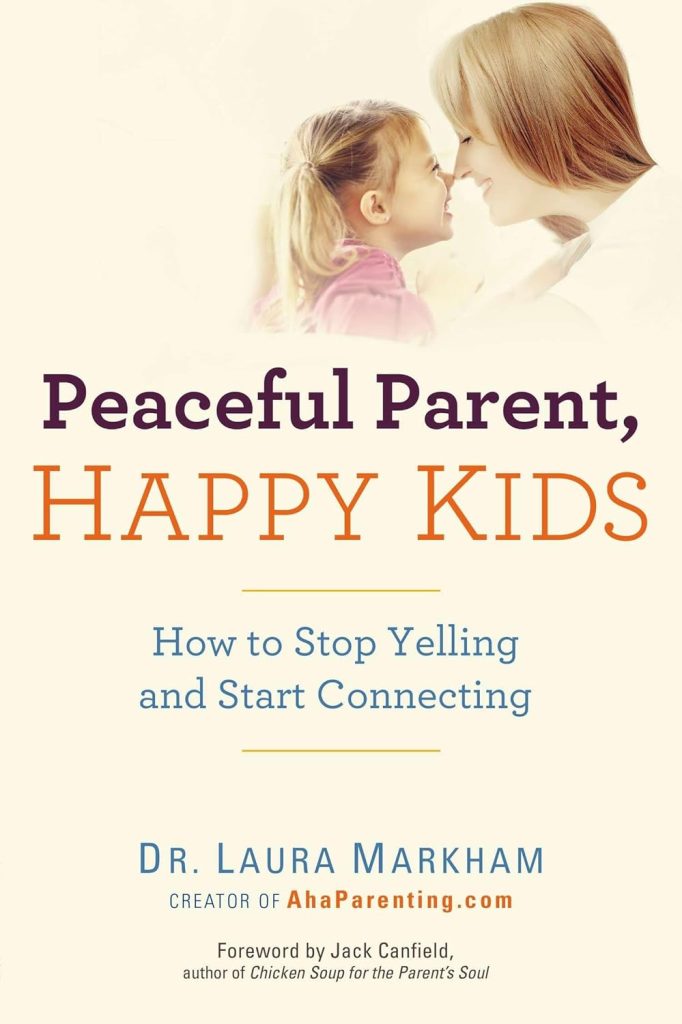
Buy The Book
Chapter
- ✦ Introduction: Secrets of Peaceful Parents
- PART ONE: REGULATING YOURSELF
- ✦ 1. Peaceful Parents Raise Happy Kids
- ✦ Your Number One Responsibility as a Parent
- ✦ Breaking the Cycle: Healing Your Own Wounds
- ✦ How to Manage Your Anger
- ✦ How to Stop Yelling at Your Child
- ✦ When Your Child Melts Down: How to Keep Your Cool
- ✦ You Can Nurture Yourself While Raising Your Child
- ✦ Ten Rules to Raise Terrific Kids
- PART TWO: FOSTERING CONNECTION
- ✦ 2. The Essential Ingredient for Peaceful Parents, Happy Kids
- ✦ Why Connection Is the Secret to Happy Parenting
- ✦ Connection as Your Child Grows
- ✦ Connection Basics
- ✦ Action Guides
- PART THREE: COACHING, NOT CONTROLLING
- ✦ 3. Raising a Child Who Can Manage Himself: Emotion Coaching
- ✦ 4. Raising a Child Who Wants to Behave
- ✦ 5. Raising a Child Who Achieves with Joy and Self-Esteem
Peaceful Parent, Happy Kids: How to Stop Yelling and Start Connecting

About
Laura Markham, a clinical psychologist specializing in child development and parenting and founder of AhaParenting.com, wrote *Peaceful Parent, Happy Kids* as a guide for parents to move away from conflict and towards a more peaceful and connected parenting style. Markham’s approach fosters emotional connection to create real and lasting change, eliminating the need to threaten, nag, plead, bribe or punish.
The book is divided into three main ideas: regulating yourself, fostering connection, and coaching, not controlling. Markham emphasizes the importance of parents managing their own emotions, enhancing the parent-child relationship, and coaching children to handle their emotions and behavior. This approach helps parents raise emotionally healthy children and build stronger, more fulfilling relationships with them. The book provides practical tools, step-by-step examples, and advice for parents of toddlers through elementary-aged children.

Spark
Learn
Review
✦ Introduction: Secrets of Peaceful Parents
Parenting is tough because the stakes are high, but there are ways to raise happy, responsible, and emotionally healthy children. Research indicates that children whose parents are attuned to their needs, set supportive limits, and constructively coach their emotions, grow into terrific kids.
Peaceful parents have a secret life within their minds; they communicate and perceive parenting from a different angle. This perspective shift boils down to three core ideas: regulating yourself, fostering connection, and coaching instead of controlling.
Most believe children’s behavior dictates parental composure, but managing our emotions allows us to parent peacefully. We can’t control children or life’s challenges, but we can manage our actions. Parenting focuses on our reactions, not the child’s actions. An adult’s calm presence is more influential than yelling.
Children flourish when they feel connected and understood. Effective parenting relies on a solid connection; otherwise, influence diminishes, and parenting becomes draining.
Small humans resist force and control. Great kids are raised by coaching them in handling emotions, managing behavior, and developing mastery, rather than demanding immediate compliance. These thoughtful parents recognize that their actions shape their child’s future self.
PART ONE: REGULATING YOURSELF
✦ 1. Peaceful Parents Raise Happy Kids
Parenting challenges every adult, often triggering unresolved emotions from childhood. The key lies not in controlling children but in managing personal reactions. Children mirror parental behavior, making emotional regulation foundational. Peaceful parenting requires inner work—acknowledging past wounds, staying present, and responding thoughtfully rather than reacting. A parent’s calm presence teaches children emotional resilience, fostering cooperation and trust. By prioritizing self-awareness, parents break cycles of reactivity, creating a nurturing environment where children thrive emotionally and behaviorally.
✦ Your Number One Responsibility as a Parent
The primary duty of parenting is self-regulation. Mindfulness—observing emotions without acting on them—transforms reactions into intentional responses. Anger, frustration, or fear signal unmet needs, not justifications for harsh discipline. By pausing to breathe and reflect, parents model emotional intelligence. This approach shifts focus from controlling a child’s actions to guiding their development through empathy. Prioritizing self-regulation ensures decisions stem from clarity, not stress, fostering a secure attachment that helps children navigate their own emotions.
✦ Breaking the Cycle: Healing Your Own Wounds
Childhood experiences shape parenting patterns. Unresolved trauma or neglect can surface as overreactions to a child’s behavior. Healing begins by revisiting these wounds with compassion. Acknowledge how past hurts influence present triggers, then reframe them through an adult lens. For example, a parent criticized harshly as a child might project insecurity onto their own children. By addressing these patterns—through therapy, journaling, or supportive relationships—parents interrupt generational cycles. This work fosters emotional availability, allowing children to grow without inheriting unprocessed pain.
✦ How to Manage Your Anger
Anger is natural but requires mindful management. Physical responses (racing heart, tension) signal the need to pause. Strategies include stepping away briefly, shaking out stress, or repeating calming mantras. Recognize anger as a defense mechanism masking vulnerability—fear of failure, inadequacy, or loss of control. Instead of venting, listen to its message: unmet needs or boundaries. Postpone discipline until calm, avoiding threats or physical force. Constructive anger management teaches children that emotions inform but don’t dictate actions, fostering mutual respect.
✦ How to Stop Yelling at Your Child
Yelling escalates conflict and erodes trust. Breaking the habit starts with commitment: publicly vow to speak respectfully and involve children in accountability (e.g., a sticker chart). When anger flares, pause mid-sentence, breathe deeply, and reset. Replace blame with curiosity—ask, “What does my child need right now?” Reframe defiance as communication; a tantrum signals overwhelm, not manipulation. Practice “do-overs” to model repair: “Let me try that again calmly.” Over time, self-restraint becomes instinctive, strengthening connection and cooperation.
✦ When Your Child Melts Down: How to Keep Your Cool
Meltdowns test parental composure. View outbursts as emotional release, not personal attacks. Stay physically present without flooding the child with words. Validate feelings (“I see you’re upset”) while maintaining boundaries. Suppressing tears or frustration teaches children to fear emotions. Instead, offer a safe space for expression. For parents triggered by their child’s distress, self-soothe first: name the emotion, breathe, and remember this phase is temporary. Calmness reassures the child they’re loved unconditionally, even in chaos.
✦ You Can Nurture Yourself While Raising Your Child
Self-care is nonnegotiable. Chronic resentment or exhaustion signals neglect. Replenish energy through small acts: a walk, a favorite song, or five minutes of quiet. Schedule “me time” without guilt—parenting from an empty cup harms both parties. Reframe chores as shared responsibilities; involve kids in calming routines like cooking or dancing. Prioritize joy: savor laughter, hugs, and milestones. By honoring personal needs, parents model self-respect, teaching children that caregiving includes caring for oneself.
✦ Ten Rules to Raise Terrific Kids
1. **Self-regulation first**: Manage emotions before addressing behavior.
2. **Unconditional advocacy**: Stand by your child’s needs, fostering security.
3. **Guide, don’t punish**: Empathy and boundaries build intrinsic motivation.
4. **Emotion coaching**: Help children name and navigate feelings.
5. **Accept imperfection**: Age-appropriate mistakes are growth opportunities.
6. **Stay curious**: Misbehavior signals unmet needs, not defiance.
7. **Prioritize connection**: Daily rituals (bedtime stories, shared meals) deepen bonds.
8. **Flexibility**: Adapt strategies as children grow.
9. **Model integrity**: Honesty, kindness, and accountability start with you.
10. **Cherish the journey**: Parenting is continual learning, not perfection.
Peaceful parenting thrives on consistency, not rigidity. Celebrate progress, forgive setbacks, and trust that nurturing connection cultivates resilient, joyful children.
PART TWO: FOSTERING CONNECTION
✦ 2. The Essential Ingredient for Peaceful Parents, Happy Kids
Secure attachments offer children the courage to explore, learn, and develop resilience, fostering self-love and the ability to love others. This bond, likened to giving roots for future wings, relies on a secure connection. Strengthening this connection is key to happy parenting, and our ability to connect deeply is influenced by emotional wholeness.
✦ Why Connection Is the Secret to Happy Parenting
Connecting with children should not be viewed as a mere duty but as a source of joy. These rewarding moments of connection make sacrifices worthwhile and teach children they are worthy of love. This deep connection makes peaceful parenting achievable. Kids willingly cooperate when they feel understood and supported. A strong parent-child bond is essential, as it surpasses the effectiveness of parenting techniques. Like coasting downhill on a bike, a close relationship eases the journey, whereas a strained bond feels like cycling uphill.
✦ Connection as Your Child Grows
* **Babies (0–13 Months): Wiring the Brain**
As crucial as nourishment, connection shapes a baby’s emotional development, influencing their capacity to manage emotions and form relationships. Interactions during infancy mold the brain and nervous system, teaching self-regulation. Loving touch regulates hormones, and heart rates synchronize, establishing emotional templates. Parents attuned to their baby’s cues foster a secure bond, where needs are met with comfort and safety.
During the first year, these interactions teach trust, shaping brain structures responsible for emotional regulation and well-being. Prioritizing connection eases care, creating a happy, cooperative child. Attentive soothing fosters emotional regulation, while close physical contact aids physiological regulation and reduces SIDS risk. Connecting helps parents understand their baby’s cues, building confidence. As a result, children will grow to be more confident.
* **Toddlers (13–36 Months): Building Secure Attachment**
As infants grow into toddlers, their connection with parents evolves. While infants require constant physical closeness, toddlers need emotional reassurance as they explore independence. Secure attachment forms when parents consistently support both exploration and comfort.
Toddlerhood brings separation anxiety, which parents can alleviate through routines and transitional objects. Toddlers express emotions intensely, and parents should validate these feelings to foster emotional intelligence. Setting clear, empathetic limits is crucial, using redirection and positive reinforcement instead of harsh punishment.
* **Preschoolers (3–5 Years): Developing Independence**
Preschoolers learn about the world through play and develop social skills through interactions. Parents can foster independence by encouraging exploration and offering support when needed. Clear expectations are important.
Preschoolers’ social interactions increase, requiring parents to teach empathy and conflict resolution. Emotional expression remains crucial, with parents guiding children in understanding and managing their feelings. Supporting their social development is key for preschoolers.
* **Elementary Schoolers (6–9 Years): Foundation for the Teen Years**
During elementary school, relationships with peers grow more important, while the parent-child bond remains central. Parents support independence while staying connected, providing guidance and a sense of security. Open communication is key, allowing children to share experiences and concerns.
Elementary-aged children develop unique interests and talents, which parents can support through encouragement and resources. Celebrating achievements fosters confidence and self-esteem. A strong connection during these years builds a foundation for the challenges of adolescence. Communication is important for elementary schoolers.
✦ Connection Basics
Connection is the foundation of a happy family and can be strengthened through daily interactions. Being present, listening, and showing empathy all enhance the bond.
Building a strong connection takes effort and consistency. Prioritizing quality time and creating shared experiences strengthens relationships. The rewards of a connected family are immeasurable.
✦ Action Guides
* **Your Child’s Emotional Bank Account**
Relationships thrive on positive interactions, so filling a child’s emotional bank account ensures resilience during tough times. This involves showing affection, listening, and creating positive experiences.
* **What’s So Special About Special Time?**
Dedicated one-on-one time strengthens the parent-child bond, making children feel valued and understood. During special time, kids have your undivided attention.
* **Daily Habits to Strengthen and Sweeten Your Relationship With Your Child**
Small gestures, like saying “I love you” or sharing a meal, can significantly impact a relationship. Consistency is more important than grand gestures.
* **Use Connection to Get Your Child Out the Door in the Morning**
Mornings can be chaotic, but connection can ease the stress. Starting the day with a hug and a smile sets a positive tone.
* **Use Connection to Make Bedtime Easier**
Bedtime routines offer a chance to connect and wind down. Reading together and sharing stories promotes relaxation and closeness.
* **Ten Ways to Become a Brilliant Listener**
Listening involves giving your undivided attention, showing empathy, and avoiding interruptions. Brilliant listening creates a safe space for sharing.
* **But How Do I Get My Child to Listen to Me?!**
Listening is a two-way street, starting with parents modeling good listening skills. When children feel heard, they’re more likely to listen in return.
* **When Your Child Just Shuts Down**
When children withdraw, empathy and patience are key. Creating a safe space encourages them to open up.
* **When You and Your Child Are Stuck in Negativity**
Breaking negative cycles requires shifting focus to the positive. Expressing gratitude and finding common ground can reset the relationship.
PART THREE: COACHING, NOT CONTROLLING
✦ 3. Raising a Child Who Can Manage Himself: Emotion Coaching
Emotions are what drive behavior, and children need the help of their parents to guide them as they navigate through their inner worlds. Emotion coaching starts with the idea that parents should accept any feeling that a child might have, even if it’s frustrating, anger, or joy. Instead of trying to shut down the emotion or making the child feel bad for having it, the parent should name it, and this will help the child build self-awareness.
When children are supported as they go through this process, they start to become more comfortable with the idea that they can tolerate discomfort and, instead of acting in ways that are impulsive, begin to make more thoughtful choices.
Key strategies for parents to employ are staying calm while the child experiences his or her emotions, modeling ways to self-regulate, and being empathetic.
Emotion coaching should also include interactions that are playful in order to practice empathy, and some ways to do this are through role-playing and storytelling to increase emotional literacy.
Emotional Intelligence as Your Child Grows:
* Babies (0-13 Months): A Bedrock Of Trust
Babies don’t have the ability to self-soothe when they are feeling overwhelmed. Babies rely completely on their parents to meet their needs, because they cannot manage their own big feelings. Parents who respond to a baby’s cries with kindness, they are teaching the baby to trust the world around him and that they are safe.
* Toddlers (13-36 Months): Unconditional Love
Toddlers are known to test limits and act out, so they will need the tools to be able to manage strong emotions. Parents can teach toddlers that they will be loved no matter what, and even during big outbursts, parents need to demonstrate unconditional love.
* Preschoolers (3-5 Years): Empathy
Preschoolers will start to be more social with other children and will start to learn empathy, which is critical for social interactions and building friendships. Parents who talk with their children about emotions can help them start to notice emotions in other people. Reading books and acting out scenes are also great ways to promote empathy.
* Elementary Schoolers (6-9 Years): EMOTIONAL Self-AWARENESS
Elementary schoolers become better able to understand their feelings and the feelings of other people, they become more skilled at managing their emotions. A parent can promote these skills by encouraging the children to talk about what makes them feel angry, sad, or happy.
When parents model good emotional regulation, this also has an impact on the child’s behavior, since the child will naturally mimic the parent’s behavior.
Emotional Coaching Basics
Parents who have the goal of wanting to coach their children through emotions should keep these points in mind:
* How Children Develop Emotional Intelligence
* Empathy, The Foundation Of EQ
* Your Child’s Emotional Backpack
* Understanding Anger
* Meeting Your Child’s Deepest Needs
* EQ Coaching With A Difficult Child
✦ 4. Raising a Child Who Wants to Behave
If a parent has a strong connection with a child, he or she will behave better and will be more willing to listen to the requests and directions. Kids want to please parents, and parents can model how to behave for them, too.
Parents can create a culture of guidance instead of discipline, which creates an atmosphere where the child feels safe. Parents can show that they are on the child’s side through empathy.
Traditional discipline relies too heavily on rewards and punishments, which may result in resentment or secrecy. Guidance is more effective if parents allow children to be themselves.
Guidance as Your Child Grows:
* Babies (0-13 Months): Empathic Redirection
Babies can’t follow directions, so parents need to have patience and gently redirect them when they do something that they aren’t supposed to do. Setting rules are gentle and are less about discipline and more about guiding the child.
* Toddlers (13-36 Months): Sidestepping Power Struggles
Toddlers are at the age where they are seeking independence, and parents need to be careful about entering into power struggles with the kids.
Parents should try to involve the children in decision-making and offer choices, if possible. They should also be empathetic when a toddler is struggling to listen.
* Preschoolers (3-5 Years): Learning Self-Management
Preschoolers are more independent and can follow more complex instructions. They still can’t always manage their emotions, so there will be times when parents will still need to redirect behavior and remind the child to be empathetic to others.
* Elementary Schoolers (6-9 Years): Developing Positive Habits
Elementary schoolers are ready to learn the positive habits that they will carry throughout their lives, and these include respecting the world around them, being kind, and managing their emotions. Parents should set clear expectations.
Setting Limits with Empathy: The Basics
It can be difficult to set effective limits. Strict can be difficult, but permissive can also cause problems, so it’s important to find a happy balance. It’s never okay to spank a child, so don’t use that as discipline. Yelling also has negative effects, so this isn’t a good way to change behavior. Replace time-outs with time-ins, and focus on consequences that make sense.
Positive parenting can work even if a child is difficult to manage, because this will encourage them to do the right thing.
✦ 5. Raising a Child Who Achieves with Joy and Self-Esteem
Mastery comes from being curious and having resilience, not from pressure, because children do well when they can make mistakes and learn from their mistakes, plus solve problems. Parents should focus on the effort, not just the outcome.
Parents can make a no-blame environment to help encourage their child to try new things, and the children won’t have to worry about failing. Parents should also allow children to do things on their own and take on responsibility.
Building Mastery as Your Child Grows
* Babies (0-13 Months): The Budding Scientist
Babies learn from experience, so they should be allowed to touch, taste, and smell. By doing these things, they will explore and learn.
* Toddlers (13-36 Months): Do It Myself: Developing Response-Ability
As toddlers seek independence, they will start to want to do everything on their own. While it can be tempting to jump in, parents should let them try on their own. It is important for parents to provide lots of encouragement.
* Preschoolers (3-5 Years): Self-MASTERY Through Problem Solving
Preschoolers can problem solve and develop skills like negotiating and sharing. Parents can help them foster these talents.
* Elementary Schoolers (6-9 Years): EXPLORING Passions
By this point, the children have had many experiences, and they may know what their passions are. Parents should allow them to explore these talents and passions and find fulfillment in these endeavors.
Parents who focus on emotional intelligence, guidance, and mastery will help develop children who are compassionate and well-rounded.
Parents must remember that they are nurturing their children, not just trying to control them.
For People
– People getting ready to have children
– Parents of children ages 1-10
– Families with multiple children
– Parents struggling with parenting/discipline
– People who want a closer relationship with their child
Learn to
– Regulate their own emotions
– Connect with their children
– Coach instead of control
– Handle sibling relationships
– Help kids master life skills









